27 Jun 2022 | Non categorizzato
In October 1946, Chiara Lubich wrote to Sister Josefina and Sister Fidente who were trying to put into practice the spirit of the emerging Movement. This excerpt from the letter captures the enthusiasm and ardour of the early days and spurs us, even today, to put God first in our lives. “God of my soul, my Love, my All, You speak to these two little hearts. Speak with Your Divine Voice. Tell them that You alone are Everything and that YOU LIVE IN THEM! Tell them not to search for you outside of themselves, but to always find you there, in their heart! You know already, Jesus, how much I love them and always want to be with them. … GOD ALONE IS EVERYTHING! And this Truth must be lived out through a burning love for Poverty! When is it that we love You, Lord? When we find You When is it that we can be sure of having found You? When we trust only in You and madly turn our gaze on high and seek only You: God–Our-Father! And now that your Brides are stripped of everything and are convinced that you alone suffice: now speak to their hearts telling them that you also accept (as I also gratefully and joyfully accept) the burning love that I bear them and the heartfelt desire to make of them what my heart would like to be for You! … My little sisters, How much good your life could accomplish, similar as it is to the life of Jesus when He lived and worked and loved in the little house of Nazareth! But don’t you realize that a soul who lives in this way, living life as a couple (Jesus and the soul), does as much as if she were out preaching to the entire universe? Now that you are stripped of your misery, which you will daily give over to God, you are free to love LOVE! He wants to live with you. And there’s nothing He desires more than this life as a couple.
Chiara Lubich
(Chiara Lubich, in Early Letters: At the origins of a new spirituality New City Press, Hyde Park, New York 2012 pp. 69-70)
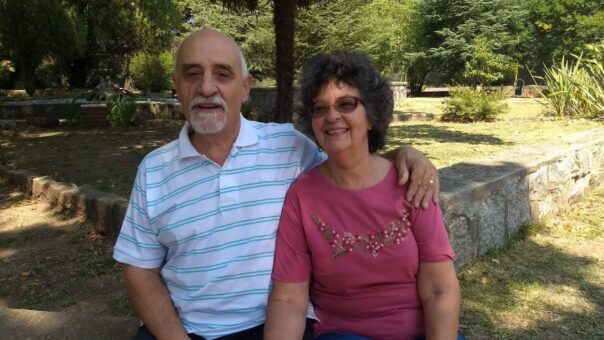
23 Jun 2022 | Non categorizzato
Family love: vocation and way to holiness. This is the theme of the Tenth World Meeting of Families being held in Rome from 22 to 26 June 2022. The voice and witness of several couples from “New Families “, a branch of the Focolare Movement, taking part in the event. 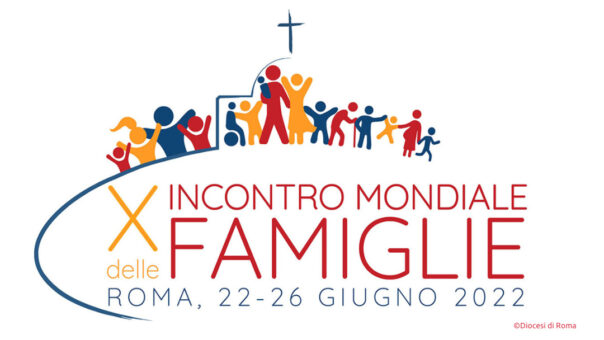 A moment of celebration and sharing to be embraced by the Church, “family of families” (Al 87) and to feel an integral part of this people on a journey. From 22 to 26 June 2022 Rome will host the Tenth World Meeting of Families, an event initiated by St John Paul II in 1994 and repeated every three years since then in different locations. The meeting, as announced by Pope Francis in a video message, is this year being held in a “multi-centred and widespread” form, responding to the needs dictated by the pandemic and the desire of so many to participate. In fact, many families around the world will be following the event from their respective dioceses, while others will have the joy of experiencing this moment in person. “This is the third time we have participated in the World Meeting of Families and each time we really bring home a load of gifts”.
A moment of celebration and sharing to be embraced by the Church, “family of families” (Al 87) and to feel an integral part of this people on a journey. From 22 to 26 June 2022 Rome will host the Tenth World Meeting of Families, an event initiated by St John Paul II in 1994 and repeated every three years since then in different locations. The meeting, as announced by Pope Francis in a video message, is this year being held in a “multi-centred and widespread” form, responding to the needs dictated by the pandemic and the desire of so many to participate. In fact, many families around the world will be following the event from their respective dioceses, while others will have the joy of experiencing this moment in person. “This is the third time we have participated in the World Meeting of Families and each time we really bring home a load of gifts”.
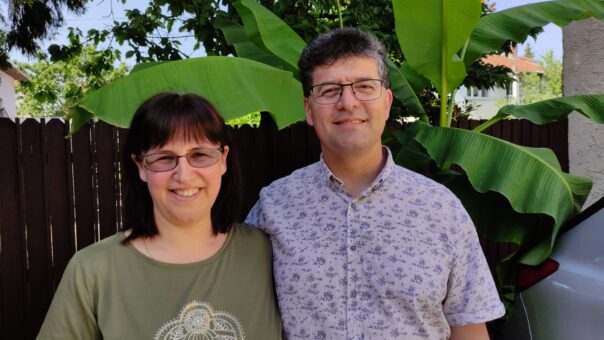
Istavan and Dori Mezaros (Serbia)
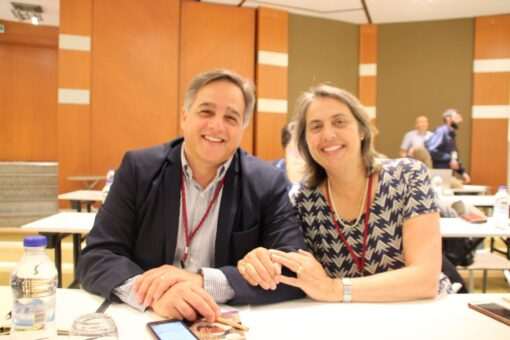
Liliana and Ricardo Galli, Brazil

Joao and Soraia Giovani, Argentina
Maria Grazia Berretta
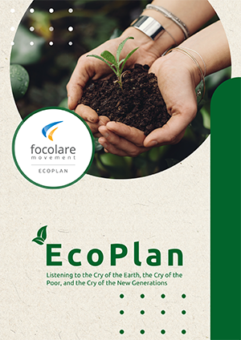
22 Jun 2022 | Non categorizzato
“We are commited to verifying the ecological sustainability of our structures and activities … We are dedicated to the creation of greater environmental awareness that will lead to more sustainable lifestyles.” Ecological conversion was one of the goals set by the Focolare Movement in the 2021 General Assembly. In response to this urgent need, the Focolare EcoPlan was initiated. “The Focolare Movement is deeply committed to ecological conversion through concrete actions and by fostering dialogue with all for the protection of our planet,” said Margaret Karram, at the opening of the fifth Halki Summit a few days ago. “Stimulated by our General Assembly at the beginning of 2021, we have decided to take courageous action through the creation of an ecological plan within our communities to bring about change and make our lives and our activities more sustainable.” 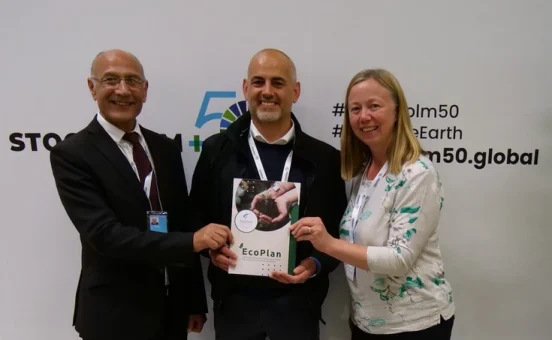 In fact, on 3 June 2022 in Stockholm, acting on behalf of all its communities, the Focolare Movement was able to present its own document – Focolare EcoPlan – which demonstrates its commitment to the environment. The presentation of EcoPlan was motivated by the spirituality that has given life to the Movement. It was officially handed over to Iyad Abu Moghli from Jordan, UNEP Senior Principal Advisor and director of the Faith for Earth Initiative, who said that the EcoPlan is “an ambitious and comprehensive ecological approach.”
In fact, on 3 June 2022 in Stockholm, acting on behalf of all its communities, the Focolare Movement was able to present its own document – Focolare EcoPlan – which demonstrates its commitment to the environment. The presentation of EcoPlan was motivated by the spirituality that has given life to the Movement. It was officially handed over to Iyad Abu Moghli from Jordan, UNEP Senior Principal Advisor and director of the Faith for Earth Initiative, who said that the EcoPlan is “an ambitious and comprehensive ecological approach.”

Download PDF
Carlos Mana
https://youtu.be/B9SSOE_yzxk
21 Jun 2022 | Non categorizzato
On 20 June 2022 a conference was held in Rome on ‘The Identity of Movements and New Communities on the Synodal Path of the Church’ promoted by the Pontifical Lateran University and the Sophia University Institute. Increasing and deepening dialogue between hierarchical and charismatic gifts, between the institutional Church, Movements and New Communities. Cardinal Marc Ouellet’s wish is that these times, characterised by the synodal journey, may bring about a broader awareness of the charisms present in all the ecclesial communities. These words of the Prefect of the Congregation for Bishops and President of the Pontifical Commission for Latin America express the important stage in the conference “The Identity of Movements and New Communities on the Synodal Path of the Church” held yesterday at the Pontifical Lateran University and promoted jointly with the Sophia University Institute. At the centre of highly qualified speeches were the journey and open questions on these new expressions of the Spirit that require up-to-date answers which measure up to a continuously and rapidly changing world. Card. Kevin Farrell, Prefect of the Dicastery for the Laity, Family and Life, identified four areas of challenge that this journey presents today: dynamic fidelity to the charism, unity, synodality and missionary spirit: “The new perspectives that the Holy Spirit opens up before us always present themselves as challenges, something that does not leave us in peace because the Spirit is dynamism, it is creativity, it is life”.
How, then, is it possible to carry out an updating that has to be done in multiple environments: formation of members, evangelisation activities, activities to help and heal society’s deepest wounds? The variety and complementarity of responses and contributions offered by representatives of the Movements and New Communities provided a panorama on the current status of these ecclesial realities. Margaret Karram, president of the Focolare Movement, stressed how “In these times when the whole Church is moving towards a synodal approach, we are called to take a step further: to walk together, united, not just within our own realities, but together with everyone”. It is only by networking, by being a gift for the Church and humanity that the Movements will also discover their own identity in a new way. Mary Healy, professor of Sacred Scripture (Sacred Heart Major Seminary in Detroit, USA) highlighted formation, evangelisation and the primacy of the charismatic dimension as the three main fruits that Movements and New Communities have been bearing since the Second Vatican Council: gifts brought to the Church and humanity, founded on a personal and communitarian encounter with Christ. Speaking about “The Ecclesial Movements and New Communities in the current kairos of the synodal process”, Mons. Piero Coda, theologian and Secretary General of the International Theological Commission and lecturer at Sophia University Institute, highlighted a challenge that is still open: the provisional nature of the configuration of these ecclesial realities with regard to their recognition in the canonical order. The care of the Church in this phase provides a foretaste, in the current dynamic ecclesiological context, to new and more mature arrangements’. The session on “Foundation, Development and Incarnation of the Charism” was then entrusted with providing a representation of the Movements and New Communities. Moysés Louro de Azevedo Filho, Founder and General Moderator of the Shalom Catholic Community, presented the spirit and aims of this ecclesial expression that is “the bearer of a charism summed up in the word spoken by Jesus when he met the disciples in the Upper Room: “Shalom”, towards communitarian holiness”. Daniela Martucci, vice-president of the Comunità Nuovi Orizzonti highlighted the heart of its charism: listening to the cry of Jesus Crucified and forsaken in the poor, the least and the discarded as well as the cry of love of the God-Man who continues to repeat: “love one another as I have loved you”. Iraci Silva Leite emphasised the centrality of the Word of God that guides the experience of the “Fazenda da Esperança”, a Word that “unites us, particularly in our efforts to live love among ourselves and to give those who suffer the presence of Jesus”. Michel-Bernard De Vregille of the Emmanuel Community touched on the theme of crises that ecclesial realities have encountered and continue to encounter: “There is often the risk of wanting to set charism and institution against each other,” he said. “However, the torch of the hierarchical and institutional Church and the torch of the charism are made to meet together and become a bright and beautiful flame illuminating the world with the presence of the Risen Lord”. For the aspect of incarnation, Prof. Luigino Bruni, an economist, focused on the ‘narrative’ challenge of charisms born in a historical period often recounted in ways that are typical of the founding period. “Updating is needed together with the charism,” he said, “without losing touch with the charism’s fundamental core. A new narrative potential will come from the pluralism of languages, from various experiences, from the dialogue between people with different sensitivities: young people and adults, academics and ordinary people, Church and movements, etc.” In the afternoon, work focused on how charisms can and should develop all aspects of the life of members and communities, from the spiritual to the organisational, by including members of different vocations, to formation, to the administration of assets and all forms of responsibility and governance. Prof. Elena Di Bernardo, Professor of Canon Law (Institutum Utriusque luris, Pontifical Lateran University) offered a highly qualified excursus on the relations between theology and canon law, as they have been realised and evolved over time. ‘It must be assumed that the identity in itself of a Movement or ecclesial reality,’ she observed, ‘is fully acquired when all the charismatic aspects constituting it have received adequate juridical configuration’. At the close of the proceedings, the report by Dr Linda Ghisoni, Undersecretary of the Dicastery for the Laity, Family and Life, entitled “Laity today in the ecclesiology of communion”, highlighted two polarities to which attention must be given: person-institution and praxis-statutes. With regard to the former, she observed that ‘the institution, Movement or new community, will be preserved if its original charism, its proper purposes in which prayer and apostolate are combined, and, above all, will be preserved if the good of the persons who make it up is safeguarded. The latter can never be an alternative to the good of the institution!” Stressing how experience painfully teaches us that whenever the ‘good name’ of the community has been preserved by sacrificing individual persons and their rights, aberrations have been committed that are detrimental to the institution as a whole. He concluded: ‘The person at the centre, always, constitutes an investment in the community or movement. The other polarity instead concerns practice and statutes: if it is true that ‘life undoubtedly anticipates every normative definition’, it is also true that any legalism or demonisation of law must be avoided, which ‘far from being a necessary evil to be endured by drawing up a list of articles, constitutes a path of freedom for all: for all members and for those who are personally called upon to be its guarantors, particularly for those who hold positions of government, at all levels’.
Stefania Tanesini
20 Jun 2022 | Non categorizzato
Jesus affirmed that we are already made clean by virtue of the Word He proclaimed to us. Therefore, it is not so much rituals that purify the soul, but His Word insofar as we are able to put it into practice. It leads us to have our hearts always set on God alone. The Word of Jesus is not like human words. Christ is present in his Word, as he is present, although in another way, in the Eucharist. Through his Word Christ enters within us and, provided we allow him to act, he makes us free from sin and therefore, pure of heart. Thus, purity is the fruit of living the Word, all the Words of Jesus which free us from the so-called attachments, into which we inevitably fall if our heart is not in God and in his teachings. These could be attachments to things, people, ourselves. But if our heart is set on God alone, all the rest falls away. To achieve this, it can be useful to repeat throughout the day, to Jesus, to God, the invocation of a Psalm which says: “You, Lord, are my only good” (cf. Psalm 16:2) [1] Let us try to repeat it often, especially when the various attachments seek to pull our heart towards those images, feelings and passions which can blur the vision of good and take away our freedom. Are we inclined to look at certain advertising posters, to watch certain television programs? No, let’s repeat to him: “You, Lord, are my only good”. Re-declaring our love for God will be the first step towards going out of ourselves. And by doing so we will have gained in purity. Do we sometimes feel that a person or an activity is coming between us and God, like an obstacle that mars our relationship with him? It is the moment to repeat: “You, Lord, are my only good.” This will help us to purify our intentions and regain inner freedom. Living the Word makes us free and pure because it is love. The divine fire of love purifies our intentions and all our inner self, because the Bible considers the “heart” to be the deepest seat of intelligence and will. But there is one love which Jesus commands us to practice and which enables us to live this beatitude. It is mutual love, being ready to give our life for others, following the example of Jesus. It creates a current, an exchange, an atmosphere whose dominant note is precisely that of transparency, purity, because of the presence of God, who alone can make us pure of heart.[2] It is by living mutual love that the Word produces its effects of purification and sanctification. As isolated individuals we are incapable of resisting at length the solicitations of the world. Instead, mutual love provides a healthy environment capable of protecting the whole of our authentic Christian existence, and in particular, our purity.
Chiara Lubich
(Chiara Lubich, in Parole di Vita, [Words of Life] Città Nuova, 2017, pp. 616-618) [1] Cf. Psalm 16,2 [2] Cf. Psalm 50, 12
17 Jun 2022 | Non categorizzato
Put God at the centre of life and be assured that you will not waver. We can experience a deep sense of consolation by living what is expressed in the words of this psalm – a sense of feeing guided in our actions and knowing, deep in our hearts, that only He makes all things good. Seeds of Peace In our apartment block there was a growing attitude of discontent relating to the administration, repairs and noise. One day I was reflecting on the words of a priest: he had said that peace begins within us, in our conscience where we find the seed of truth that is God. This is a seed that germinates and grows when charity is put into practice in everyday life. I talked about the situation with my family and we came up with the idea of making some small improvements in the building every day, without telling other people what we were doing. For example, we decided to remove the dead leaves from the plants at the entrance and water them and we cleaned the glass and frames of the paintings in the foyer, which had perhaps never been dusted since they had been hung on the wall. Of course, these were the tasks that the people paid for cleaning should have carried out but at the following tenants’ meeting, the administrator pointed out that for a while, everyone had begun to feel that the environment was more welcoming and people began to share ideas about painting the staircase. When I reported this to the children, they were enthusiastic. A contribution to improving the world can start in even in one’s own apartment building. (C. – Croatia) The “bundle” to share From the very beginning of our marriage, we shared everything with one another. One day, my wife and I sat around a small table, trying to set up the family economy. Beyond the figures in themselves, the income and expenditure marked a growth in the quality of the relationship between us. We also involved our children. From then on, it became normal for a little used a pair of shoes, for example, to be seen as useful to someone else or for our indispensable outgoings to include a sum of money for a neighbour in need. A further step was the so-called ‘bundle’ to share with others: the focus of this was to give away what was not really needed. Only later did we realise the importance of what we had done. We felt that we had begun to relate to people who could need anything. Even a pencil, a book or a blanket became a sign of caring for others. This attitude renewed our lives. (L.R. – Holland) Trust I had lost my job, but I was confident that God’s Providence would help me find another one: had I not experienced many times that my efforts to put Gospel love into practice would be answered by “give and it will be given to you” (Lk 6:38) ? That very day, in the parish, I had to meet with a group of people and recount my experience as a Christian. At the end, I also mentioned that I was looking for a job. A girl who was present at that meeting told me that they were looking for an employee in her father’s company. That is how, by trusting, I found work. (F.I. – Italy)
Edited by Maria Grazia Berretta
(Taken from Il Vangelo del Giorno, Città Nuova, year VIII, no.2, May-June 2022)


 A moment of celebration and sharing to be embraced by the Church, “family of families” (Al 87) and to feel an integral part of this people on a journey. From 22 to 26 June 2022 Rome will host the
A moment of celebration and sharing to be embraced by the Church, “family of families” (Al 87) and to feel an integral part of this people on a journey. From 22 to 26 June 2022 Rome will host the 


 In fact, on 3 June 2022 in Stockholm, acting on behalf of all its communities, the Focolare Movement was able to present its own document – Focolare EcoPlan – which demonstrates its commitment to the environment. The presentation of EcoPlan was motivated by the spirituality that has given life to the Movement. It was officially handed over to Iyad Abu Moghli from Jordan, UNEP Senior Principal Advisor and director of the Faith for Earth Initiative, who said that the EcoPlan is “an ambitious and comprehensive ecological approach.”
In fact, on 3 June 2022 in Stockholm, acting on behalf of all its communities, the Focolare Movement was able to present its own document – Focolare EcoPlan – which demonstrates its commitment to the environment. The presentation of EcoPlan was motivated by the spirituality that has given life to the Movement. It was officially handed over to Iyad Abu Moghli from Jordan, UNEP Senior Principal Advisor and director of the Faith for Earth Initiative, who said that the EcoPlan is “an ambitious and comprehensive ecological approach.”